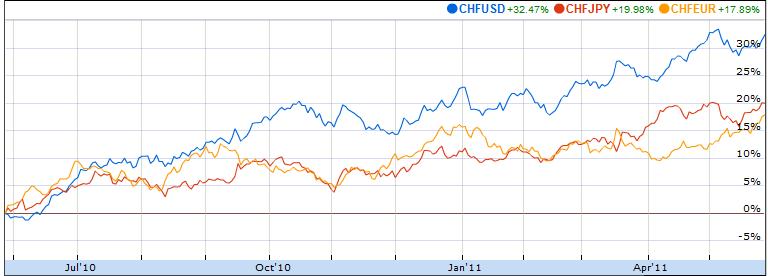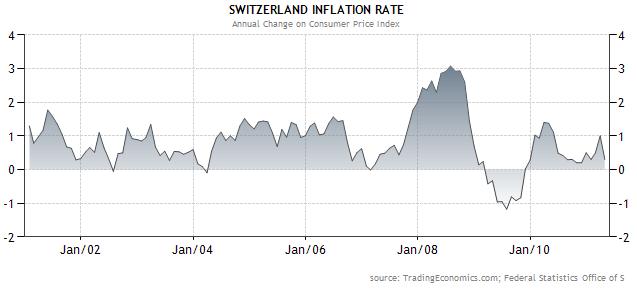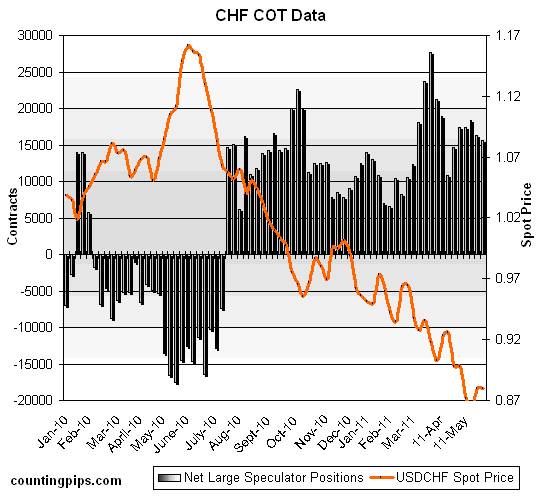This month, the Swiss Franc touched a record high against not one, but two currencies: the US dollar and the Euro. Having risen by more than 30% against the former and 20% against the latter, the franc might just be the world’s best performing currency over the last twelve months. Let’s look at the prospects for continued appreciation.

As I wrote on Monday, the Swiss Franc has been one of the primary beneficiaries of the safe haven trade. With each spike in volatility, the Swiss Franc has ticked upward. Due to monetary and fiscal stability as well as political conservatism, investors have flocked to the Franc in times of crisis. Of course, the Japanese Yen (and the US dollar, of late) has also received a boost from this phenomenon, but to a lesser extent than the franc, as you can see from the chart above.
Personally, I wonder if this isn’t because the Swiss economy is significantly smaller than that of Japan and the US. In other words, its capacity to absorb risk-averse capital inflows is much smaller than that of Japan and the US. For example, the impact of one million people suddenly rushing out to buy shares in IBM stock would have a much smaller impact on its share price compared to a sudden speculative flood into FXCM. The same can be said about the franc, relative to the dollar and yen.
Ironically, the franc is also rising because of regional proximity to the eurozone. I use the term ironic to denote in order to signify that the franc is not being buoyed by positive association with the euro but rather because of contradistinction. In other words, each time there is another flareup in the eurozone sovereign debt crisis, the franc typically experiences the biggest bounce because it is the easiest currency to compare with the euro. In some ways, it is basically just a more secure version of the euro. This phenomenon has intensified over the last month, as the euro faces perhaps its most uncertain test yet.
It is curious that even as investors have gradually become more inclined to take risk, that not only has the franc held its value, but it has actually surged! Perhaps this is because it is expected that the Swiss National Bank (SNB) will soon hike interest rates, making the franc both high-yielding and secure. To be sure, some analysts think that the SNB will hike as soon as June. The fact the the economy has continued to expand and exports have surged in spite of the strong franc only seems to support this notion.

On the other hand, inflation is still basically nil. And just because the Swiss economy can withstand an interest rate hike hardly provides adequate justification for implementing one. Besides, the SNB hardly wants to give the markets further cause to buy the franc. If anything, it may even need to intervene verbally to make sure that it doesn’t rise any higher. Thus, “The median forecast among economists is for a rate increase in September.”

In short, I think the franc is overbought against the dollar. In fact, you can see from the most recent Commitment of Traders data that speculators have been net long the franc for almost an entire year, and it seems inevitable that this will need to reverse itself. On the other hand, the franc probably has more room to rise against the euro. The takeaway here is that it is less important to know where you stand on the franc in general and more important to understand the cross currency.
ليست هناك تعليقات:
إرسال تعليق